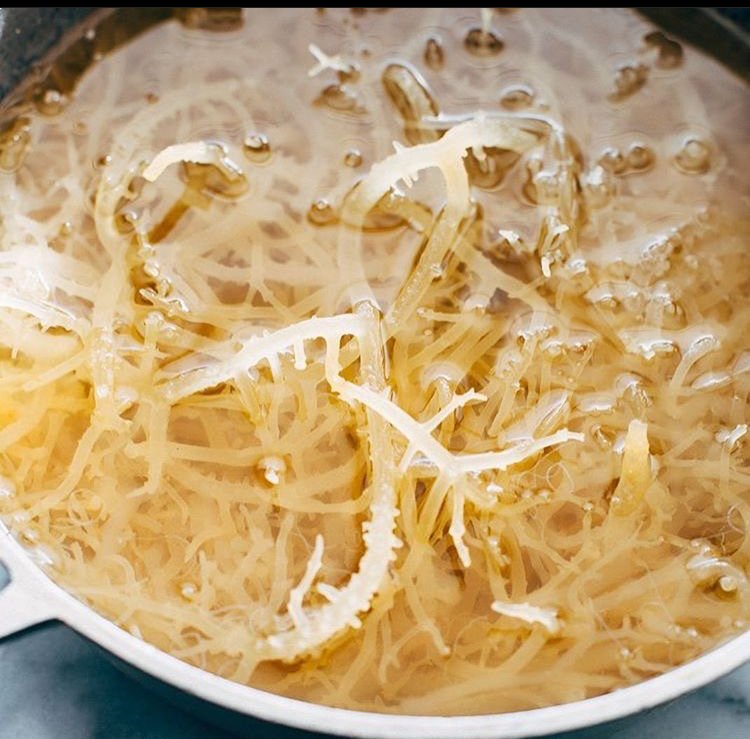H ealth Benefits of Sea-moss
According to Dr. Cynthia Archibald, Phd, ARNP and co-founder of Faith Based Health Initiative (FABHI), sea moss might rank among the most nutrient-packed foods globally. “It is a rich source of many vitamins, minerals, polyunsaturated fats, and anti-inflammatory compounds,” she remarks. She points out that sea moss is low in calories and sugar, with a small protein content and low-fat levels, predominantly consisting of polyunsaturated fat, which can aid in reducing cholesterol levels.
(Video lightbox here)
Dr. Archibald highlights the notable iron and magnesium content in sea moss, noting that just one ounce (28.3 grams) of sea moss can supply 14% of the daily value of iron, crucial for healthy red blood cells, and 10% of the daily value for magnesium, which plays a role in over 300 biochemical reactions in the body.
Dr. Cleopatra Gordon Pusey, a physician specializing in family medicine at Life is beautiful MD Hollywood, acknowledges the historical use of sea moss for consumption and healing but points out the scarcity of scientific evidence supporting many claims. Nevertheless, ongoing research shows promising signs regarding sea moss’s potential to alleviate inflammation and related conditions.
While there’s more extensive research on the benefits of seaweeds in general compared to sea moss specifically, preliminary studies indicate potential advantages. However, larger clinical trials are necessary to confirm these findings conclusively.
Recent research is starting to shed light on its potential and so far, researchers are able to make amicable decisions behind these claims.
Packed with Nutrients:
- Dietitians praise sea moss for its density in vitamins, minerals, and healthy fats.
- It’s low in calories and sugar, making it a guilt-free addition to your diet.
- Iron and magnesium are particularly abundant, contributing to healthy blood cells and various bodily functions.
Thyroid Health:
- Sea moss is a natural source of iodine, crucial for proper thyroid function and hormone production.
- Iodine deficiency can lead to an enlarged thyroid, fatigue, and developmental problems in children.
- While iodized salt has addressed deficiency concerns in some areas, sea moss can be a valuable source for those seeking additional iodine.
Gut Health Promise:
- A healthy gut microbiome is essential for overall well-being.
- Sea moss may act as a prebiotic, promoting the growth of beneficial gut bacteria.
- Studies suggest this potential, but further research is needed to confirm its effectiveness in humans.
Muscle Recovery:
- Early research suggests that sea moss may support muscle health and recovery.
- A small study linked a high-protein sea moss supplement to improved muscle energy recovery.
- The various nutrients in sea moss might contribute to building and maintaining muscle and bone structure.
Beyond the Basics:
- While less studied, sea moss shows potential benefits in areas like:
- Neuroprotection (from animal studies)
- Anti-cancer properties (observed in mice)
- Immune system stimulation (in worms)
- Reducing inflammation (in cell studies)
Important Considerations:
- Most research on sea moss is preliminary and requires further investigation, particularly large-scale human trials.
- Consulting a healthcare professional before incorporating sea moss into your diet is essential, especially if you have any underlying health conditions.
Sea moss holds promise as a natural source of essential nutrients and may offer various health benefits. However, more research is needed to solidify its role in promoting overall well-being
The nutritional breakdown for a small serving of 2 tablespoons (10 grams) of sea moss, as provided by the U.S. Department of Agriculture, is as follows:
- Calories: 5
- Protein: 0.2 grams
- Total fat: 0.02 grams
- Dietary fiber: 0.13 grams
- Carbohydrate: 1.2 grams
- Sugars: 0.06 grams
- Calcium: 7.2 milligrams
- Iron: 0.89 milligrams
- Magnesium: 14.4 milligrams
- Phosphorus: 15.7 milligrams
- Potassium: 6.3 milligrams
- Sodium: 6.7 milligrams
- Zinc: 0.195 milligrams
- Copper: 0.015 milligrams
